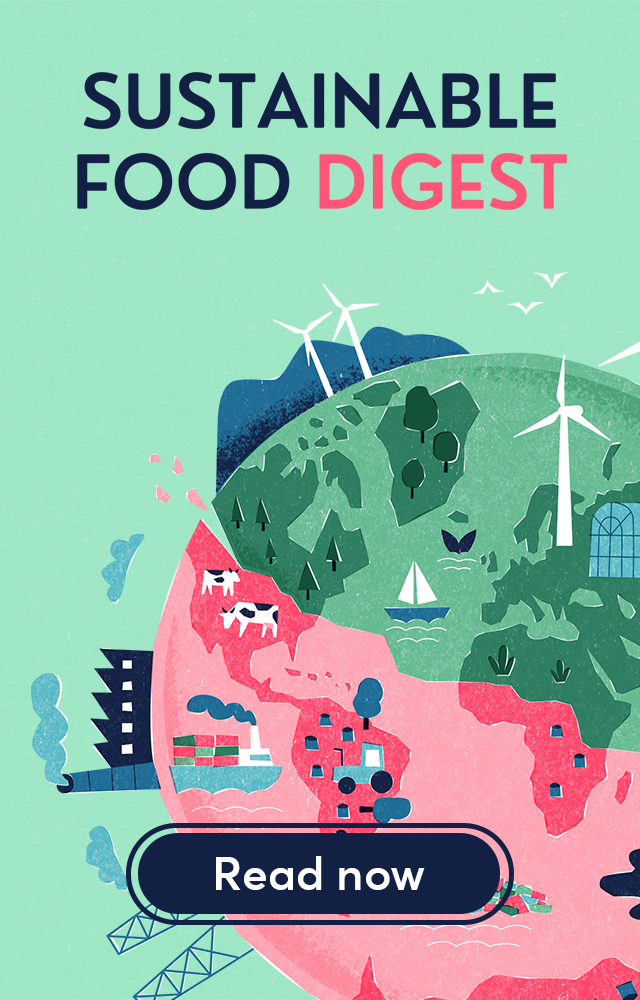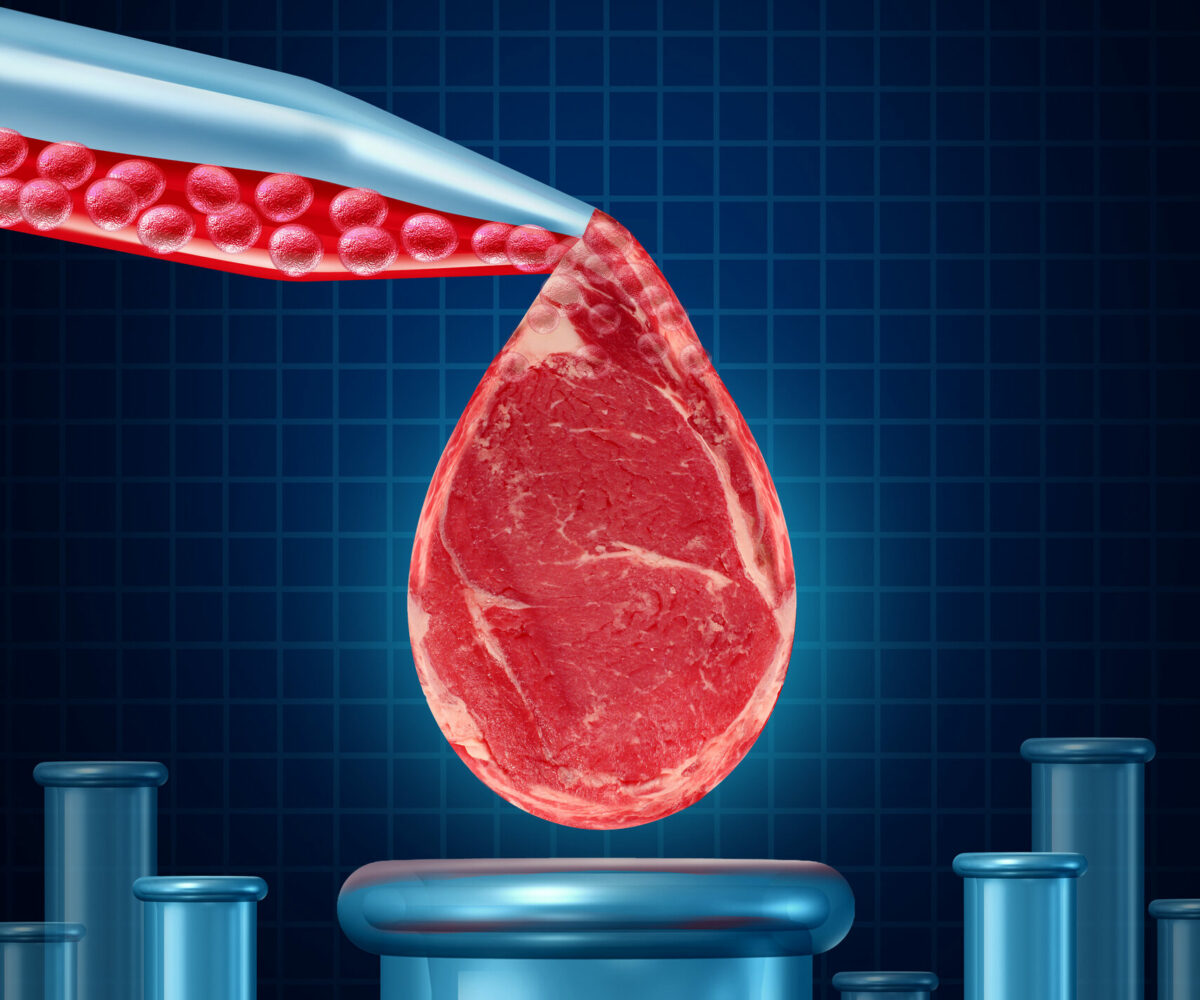Bruce Friedrich interview: “Building a better and more sustainable food system is one of the most important challenges of our age.”

If you are interested in food innovation and sustainability, Bruce Friedrich is a name you’ll be very familiar with. A graduate of Georgetown Law, Johns Hopkins University and the London School of Economics, in 2016 Friedrich founded nonprofit organisation The Good Food Institute (GFI), of which he serves as President.
Today the GFI has over 200 full-time team members across affiliates in the US, Europe (UK and EU), India, Israel, Brazil and Singapore and its work focusses on alternative protein policy, science, and corporate engagement. The NGO’s work aims to strengthen the global protein supply by accelerating the production of plant-based and cultivated meat, promote sustainability and environmentally-friendly practices, and improve global food security and health.
As well as overseeing the GFI’s global strategy, Bruce Friedrich regularly writes op-eds for publications such as The Wall Street Journal, USA Today, Los Angeles Times and Wired, is a regular guests on round tables, podcasts and radio shows, and is a TED Fellow.
Bruce’s 2019 TED talk has been viewed two million times and translated into dozens of languages.
I catch up with Bruce to discuss the future of alternative proteins and the role of governments in helping to scale the sector, the recent approval of cultivated meat in the United States, and the stance of countries such as Italy towards cellular agriculture.
There is more information than ever about the damaging effects of meat, fish and dairy production on the environment, more Big Food companies, restaurants and fast food chains are now producing or offering plant-based alternatives, yet, despite the availability of more and more vegan products on the market and many people buying them regularly, the consumption of meat is still going up globally. What do you think it will take for people to realise they need to reduce or altogether stop eating animal products? Why is there still such a disconnect, despite all the available information?
The answer is simple – most people’s food choices are based on two simple factors: taste and price.
A lot of the problems we’ve seen in the plant-based market recently are down to the fact that these foods still aren’t hitting those metrics – they’re not delivering the flavours consumers crave and, as people feel the impact of inflation, they’re too expensive.
This brings me back to your last question. Plant-based meat is still in its infancy, and for these foods to become delicious, affordable and accessible to as many people as possible, we need governments to invest in the research and infrastructure the sector needs – just as they did for renewable energy.
Plant-based meat is still in its infancy, and for these foods to become delicious, affordable and accessible to as many people as possible, we need governments to invest in the research and infrastructure the sector needs – just as they did for renewable energy.”
It’s impossible to overplay the importance of this. The world’s population is forecast to reach 10 billion by 2050, and those people are eating more and more meat. It will be impossible to feed them using a system as inefficient as industrial animal agriculture, which takes nine calories of feed to produce one calorie of chicken meat.
Plant-based food is often accused of being ultra-processed, yet we know very well that many animal-based products often barely contain any of the ingredients they are meant to, but have a large amount of additives, whilst there are plenty of plant-based products made with only a few ingredients. How can we change the perception of vegan foods?
I think we need a more well-informed, nuanced conversation about what the term ‘ultraprocessed’ means.
Virtually everything we eat – from pasta sauce to bread – is processed. Processing can be used to make food safer, add vitamins and minerals, and to preserve food for longer to prevent waste. The number of ingredients doesn’t determine the healthiness of a product. Lard has one ingredient and a loaf of wholemeal bread has many, but few would argue that lard is healthier than wholemeal bread.
Compared to the conventionally produced meat these products are intended to replace, plant-based meat is lower in saturated fat, has a lower caloric density, has more fibre and complex carbs, and has no cholesterol at all. In short, it’s healthier, as we discuss here.
Many food giants have now entered the plant-based sector, Nestlé, Unilever… . Some accuse them of profiteering, others of normalising plant-based produce and making it more democratic. What are your thoughts on this?
These leading food companies have the infrastructure to scale up production and the technical know-how to boost research and development, so we need them to come on board if we’re going to improve quality, bring down costs and make plant-based foods become a default option for everyone.
However, plant-based meat can be produced by companies of all shapes and sizes, tailored to the needs and tastes of different cultures.
When European regulators approve products, it should be up to consumers rather than politicians to decide whether or not they want to eat cultivated meat.”
There’s room for everyone in this space, which means bigger companies working hand in hand with startups. To enable a diverse ecosystem of companies where independent producers can thrive, we need governments to fund open-access research, to democratise the possibilities of plant-based meat – rather than leaving innovation to private companies.
You have often spoken about the need for government subsidies to help scale alt proteins such as cultivated and plant-based, just like governments have subsidised renewable energy, yet, aside from a few exceptions, this is not happening widely yet. What do you think will take for governments to understand the need for this financial support and take an active role in the production of sustainable proteins?
Our recent State Of Global Policy report found we are slowly starting to see the dial shift on this, with governments worldwide realising the importance of sustainable proteins.
In Europe, the Dutch government is leading the way by announcing €60 million for the world’s largest ever public investment in cellular agriculture, and earlier this year the UK government invested £12 million in a new hub investigating how to manufacture cultivated meat at scale.
But governments need to go further and faster. World leaders need to look at the floods, heatwaves and wildfires we’ve seen over the last few months and understand the urgency of building a more resilient and sustainable food system. They need to realise that even if fossil fuel emissions were eliminated overnight, the world wouldn’t meet its Paris Agreement targets without shifting away from conventional animal agriculture. They need to understand the importance of investing in foods that can reduce emissions and free up land for nature restoration and more sustainable farming.
And, on a practical level, they need to recognise the potential of this sector in value-for-money terms. According to Boston Consulting Group and Blue Horizon, for every trillion dollars invested in developing plant-based meat, 4.4Gt of CO2e could be saved – three times more than the same investment in other high-emitting sectors, such as transport or buildings.
Do you think schools should teach children about farming and where food comes from? For instance, having lessons on factory farming and agriculture?
I don’t think it’s a bad idea – I’m open to any suggestions that might make people more aware of the harms caused by industrial animal agriculture. But I don’t think this will get to the heart of the problem. Vegetarian and vegan organisations worldwide have been trying to educate people for decades about why they should eat less meat, and it hasn’t altered the fact that global demand for meat is now expected to grow by more than half by 2050.
World leaders need to look at the floods, heatwaves and wildfires we’ve seen over the last few months and understand the urgency of building a more resilient and sustainable food system. They need to realise that even if fossil fuel emissions were eliminated overnight, the world wouldn’t meet its Paris Agreement targets without shifting away from conventional animal agriculture.”
You can give people as much information as you like, but until we can make plant-based, cultivated or fermentation-made meat that tastes as good or better and is as affordable as – or cheaper than – conventional meat, we won’t be able to reverse that trend.
Cultivated meat is often accused of being ‘synthetic’ and ‘unnatural’, yet the way it’s produced means it requires fewer additives, like antibiotics, that can create issues for humans, such as antibiotic-resistance. Some governments, such as the current Italian one, are adamant they will ban the research, production and sales of cultivated meat in the country, although human consumption of cultured products has not even been legalised in Europe yet. Why do you think there is resistance to this technology? I interviewed the Italian Minister of Agriculture recently and he stated cultivated meat could obliterate traditional animal agriculture in Italy and that the way it’s produced – in his opinion – could potentially be even less sustainable than traditional farming. Why are so many people and politicians hesitant to look at the science?
Cultivated meat is a transformative technology, and I completely understand why many people are hesitant when they first hear about it. That’s why we need open and honest conversations based on evidence, particularly with politicians. Peer-reviewed research shows cultivated meat has the potential to slash emissions by up to 92% compared with conventional meat, and to help combat the threat of antimicrobial resistance. We also need open dialogue about how cultivated meat’s efficiency can enable more sustainable farming practices by freeing up land, and policymakers need to work with farming communities to support them in implementing those practices.
It’s a real shame to see a country that has always been a pioneer of food innovation cutting itself off from the opportunity to shape the future of cultivated meat. The Italian government is a real outlier here, both in terms of wanting to shut down the science and wanting to stamp on consumer choice – as other governments across Europe and the world begin to invest.
Nobody likes being told what they can and can’t eat, and a study by GFI Europe last year found 55% of Italians were willing to buy cultivated meat when it comes to market. When European regulators approve products, it should be up to consumers rather than politicians to decide whether or not they want to eat cultivated meat.
Cultivated meat has recently been approved for human consumption in the US. In your opinion, how long will it take for other countries to follow suit?
We’ve just had the exciting news that Aleph Farms have put in the first European applications to Swiss and British regulators, and applications are also currently under review in Israel, Australia and New Zealand, with others expected by the end of 2023. I don’t want to go into the prediction business and give you a date – regulators need the time and space to do their important work and give consumers confidence in this new food – but I’m confident we’ll see people in a lot more countries taking their first bites of cultivated meat within the next few years.
The world’s population is forecast to reach 10 billion by 2050, and those people are eating more and more meat. It will be impossible to feed them using a system as inefficient as industrial animal agriculture, which takes nine calories of feed to produce one calorie of chicken meat. “
As far as Europe’s concerned, Switzerland and the UK both have a history of food innovation and consumers with an appetite for more sustainable products, so I’m sure we’ll see lines around the block when this food goes on sale there – likely in at least 18 months.
But it’s striking that Europe’s first cultivated meat applications haven’t landed in Brussels. With Italy trying to ban cultivated meat while countries like the Netherlands invest, Europe is sending mixed messages to companies who need certainty to deliver on their potential. The EU must develop a coherent strategy to support the sustainable protein sector and ensure regulatory processes are clear.
In many interviews you have said that if we want to change the food system, we need to work within the system. Do you think this is happening fast enough? What else needs to be done?
The short answer is no. We’re seeing some excellent examples, such as dairy company Arla Foods Ingredients working with biotech firm Novozymes to develop ingredients using precision fermentation, and Bitburger Brewery providing brewing byproducts to Germany’s Mushlabs to feed their fermentation process.
You can give people as much information as you like, but until we can make plant-based, cultivated or fermentation-made meat that tastes as good or better and is as affordable as – or cheaper than – conventional meat, we won’t be able to reverse that trend.”
But we urgently need to see more major food companies coming on board and providing the infrastructure and R&D clout needed to push sustainable proteins into the mainstream.
For that to change, companies need to understand the enormous benefits of getting involved in sustainable proteins – there is a huge opportunity for businesses here, in terms of tapping into enormous new markets and boosting their ESG credentials. Our recent plant-based and fermentation manufacturing analysis reports made some excellent suggestions for companies, such as the value of retrofitting existing buildings and equipment as a feasible and affordable way of scaling up quickly.
There are currently several start-ups working in the cultivated meat space. Some will probably become commercial and viable, whilst some won’t make it – just like in any other sector. Do you think we’ll ever see the day where cultivated meat becomes a direct competitor to meat derived from slaughtered animals?
Research by CE Delft shows that by 2030, cultivated meat’s production costs could fall dramatically, approaching the level where it can compete with conventional meat.
But for that to happen, the public and private sectors will need to invest significant sums into research and development to overcome the existing obstacles, from increasing the availability of cell lines to reducing the cost of cell culture media – the nutrient-rich broth cells need to grow – and building larger and more efficient cultivators.
Building a better and more sustainable food system is one of the most important challenges of our age, and if we’re going to take advantage of this huge opportunity, governments and businesses need to get behind this effort and invest.









